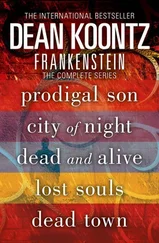Words eluded him again, and he surveyed the coffee shop, as if someone might step forward to speak for him. He realized people were staring, and embarrassment drew a tighter knot in his tongue.
“Why don't we take a walk together?” the doctor asked.
“I'm sorry. I interrupted. Made a scene."
“You didn't at all,” Dr. Salk assured him. “I need to talk to you. If you would give me a little of your time..."
The word need, instead of want, moved Paul to follow the doctor across the coffee shop.
Outside, he realized he hadn't paid for his juice and waffles. When he turned back to the coffee shop, he saw, through one of the windows, an associate of Salk's picking up the check from his table.
Putting an arm around Paul's shoulders, Dr. Salk walked with him along a street lined with eucalyptuses and Torrey pines, to a nearby pocket park. They sat on a bench in the sunshine and watched duck waddle on the shore of a man-made pond.
Salk still held the two photographs. “Tell me about Perri."
“She ... she died."
“I'm so sorry."
“Five months ago."
“I really would like to know about her."
Whereas Paul had been confounded in his desire to express his admiration for Salk, he was able to speak about Perri at length and with ease. Her wit, her heart, her wisdom, her kindness, her beauty, he goodness, her courage were the threads in a narrative tapestry that Pad could have continued weaving for all the rest of his days. Since her death, he hadn't been able to talk about her with anyone he knew, because his friends tended to focus on him, on his suffering, when he wanted them only to understand Perri better, to realize what an exceptional person she had been. He wanted her to be remembered, after he was gone, wanted her grace and her fortitude to be recalled and respected. She was too fine a woman to leave without a ripple in her wake, and the thought that her memory might pass away with Paul himself was anguishing.
“I can talk to you,” he said to Salk. “You'll understand. She was hero, the only one I ever knew till I met you. I've read about them all my life, in pulp magazines and paperbacks. But Perri ... she was the real thing. She didn't save tens of thousands-hundreds of thousands of children like you've done, didn't change the world as you've changed it, but she faced every day without complaint, and she lived for others. Not through them. For them. People called her to share their problem, and she listened and cared, and they called her with their good news be cause she took such joy in it. They asked for her advice, and though she was inexperienced, really, so short of experience in so many ways, she always knew what to say, Dr. Salk. Always the right thing. She had great heart and natural wisdom, and she cared so much."
Studying the photos, Jonas Salk said, “I wish I'd known her."
“She was a hero, just like you. I wanted you ... I wanted you to see her and to know her name. Perri Damascus. That was her name."
“I'll never forget it,” Dr. Salk promised. With his attention still on Perri's pictures, he said, “But I'm afraid you give me far too much credit. I'm no superman. I didn't do the work alone. So many dedicated people were involved."
“I know. But everyone says you're—"
“And you give yourself far too little credit,” Salk continued gently. “There's no doubt in my mind that Perri was a hero. But she was married to a hero, as well."
Paul shook his head. “Oh, no. People look at our marriage, and they think I gave up so much, but I got back a lot more than I gave."
Dr. Salk returned the photos, put a hand on Paul's shoulder, and smiled. “But that's always the way, you see? Heroes always get back more than they give. The act of giving assures the getting back."
The doctor rose, and Paul rose with him.
A car waited at the curb in front of the park. Dr. Salks two associates stood beside it and seemed to have been there awhile.
“Can we give you a ride anywhere?” the hero asked.
Paul shook his head. “I'm walking."
“I'm grateful that you approached me."
Paul could think of nothing more to say.
“Consider what I told you,” Dr. Salk urged. “Your Perri would want you to think about it."
Then the hero got in the sedan with his friends, and they drove away into the sun-splashed morning.
Too late, Paul thought of the one more thing he had wanted to say. Too late, he said it anyway, “God bless you."
He stood watching until the car cruised out of sight, and even after it dwindled to a speck and vanished in the distance, he stared at the point in the street where it had last been, stared while a breeze turned playful, tossing eucalyptus leaves around his feet, stared until at last he turned and began the long walk home.
He had been walking ever since, two and a half years, with brief respites in Bright Beach.
Admitting to the likelihood that he would never again devote himself seriously to his business, Paul sold it to Jim Kessel, long his good right hand and fellow pharmacist.
He kept the house, for it was a shrine to his life with Perri. He returned to it from time to time, to refresh his spirit.
During the rest of that first year, he walked to Palm Springs and back, a round trip of more than two hundred miles, and north to Santa Barbara.
In the spring and summer of '66, he flew to Memphis, Tennessee, stayed a few days, and walked 288 miles to St. Louis. From St. Louis he hiked west 253 miles to Kansas City, Missouri, and then southwest to Wichita. From Wichita to Oklahoma City. From Oklahoma City east to Fort Smith, Arkansas, from whence he rode home to Bright Beach on a series of Greyhound buses.
He slept outdoors rarely and otherwise stayed in inexpensive motels, boardinghouses, and YMCAs.
In his light backpack, he carried one change of clothes, spare socks, candy bars, bottled water. He planned his journeys to be in a town every nightfall, where he washed one set of clothes and donned the other.
He traveled prairies and mountains and valleys, passed fields rich in every imaginable crop, crossed great forests and wide rivers. He walked in fierce storms when thunder crushed the sky and lightning tore it, walked in wind that skinned the bare earth and sheared green tresses from trees, and walked also in sun-scrubbed days as blue and clean as ever there had been in Eden.
The muscles of his legs grew as hard as any of the landscapes that he trod. Granite thighs; calves like marble, roped with veins.
In spite of the thousands of hours that Paul was afoot, he seldom thought about why he walked. He met people along the way who asked, and he had answers for them, but he never knew if any answer might be the truth.
Sometimes he thought he walked for Perri, using the steps she had stored up and never taken, giving expression to her unfulfilled yearning to travel. At other times, he thought he walked for the solitude that allowed him to remember their life in fine detail-or to forget. To find peace—or seek adventure. To gain understanding through contemplation—-or to scrub all thought from his mind. To see the world or to be rid of it. Perhaps he hoped that coyotes would stalk him through a bleak twilight or a mountain lion set upon him on a hungry dawn, or a drunk driver run him down.
In the end, the reason for the walking was the walking itself. Walking gave him something to do, a needed purpose. Motion equaled meaning. Movement became a medicine for melancholy, a preventive for madness.
Through fog-shrouded hills forested with oaks, maples, madrones, and pepperwoods, through magnificent stands of redwoods that towered three hundred feet, he arrived in Weott on the evening of January 3, 1968, where he stayed the night. If Paul had any northernmost goal for this trip, it was the city of Eureka, almost fifty miles farther-and for no reason, other than to eat Humboldt Bay crabs at their origin, because that was one of his and Perri's favorite foods.
Читать дальше











